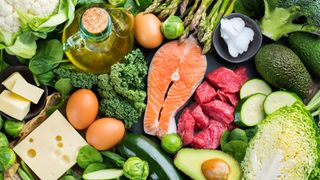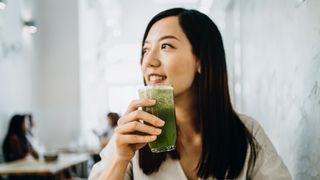Keto diet foods: what to eat and what to avoid
Low in carbs and high in protein, these are the keto diet foods to fill your plate with

For some individuals, the ketogenic diet can be an effective way to lose weight or manage certain conditions – but it's important that it's undertaken with the supervision of a medical professional. So what are some keto diet foods that you can eat, and which foods are off limits? We’ve spoken to the experts to find out what you should and shouldn’t be eating if you're following a keto diet.
The keto diet works by swapping our body’s energy source from carbohydrates to ketones, which are produced when the body goes into an alternative metabolic state called ketosis. By removing carbohydrates, your body is forced to metabolize fat, which is what produces the ketones that it then uses to run itself. This can initially lead to uncomfortable symptoms, known as the keto flu, which can make it hard to stick to, but these symptoms generally pass with time as your body adjusts.
It's important to note that the keto diet is an extremely restrictive way of eating, and you risk developing nutrient deficiencies. This is why it is important to only undertake the keto diet with the help of a dietician or medical professional. Additionally, you may lose your weight loss results once you reintroduce carbohydrates into your diet, so nutritional guidance at this phase is also crucial. Our guide to the keto diet for beginners has some meal inspiration, safety tips and expert advice and our 7 day keto meal plan gives you a week of keto-friendly meals.
Keto diet: What to eat
For a diet to be truly 'keto' only 5-10% of daily energy should come from carbohydrates, which amounts to less than 50g of carbs a day. The rest should be coming 10-20% from protein and 70-80% from fats. Although the fat content is higher, for success on a keto diet, it is encouraged that you build your meals around high protein foods, as protein has been shown to help with feelings of satiety, according to a study in the British Journal of Nutrition.
Sophie Medlin, leading consultant dietitian and founder of City Dietitians, explains further: “The keto diet is based on the idea that you will use fat from your diet or fat stored in your body as your main sources of energy as opposed to carbohydrates and your body fat as your main sources of energy. That means that on the keto diet, people generally eat high protein foods such as meat, fish, eggs and dairy and low carbohydrate vegetables such as kale, broccoli and spinach.
“Many people on the keto diet buy keto products which are generally highly processed foods packed with preservatives, sweeteners and emulsifiers which are not recommended as part of a healthy, balanced diet.”
- Related: Which vegetables are low in carbs?

Dr Deborah Lee, of Dr Fox online pharmacy, explains that some vegetables are lower carb than others and are more suitable for the keto diet. “You need to be very careful to keep your carb intake less than 50g a day, which isn’t easy. An easy way to remember this is to think about whether the vegetables are grown above or below ground. Above-ground vegetables (lettuce, cucumber, tomatoes, peppers etc.) are low carb, whereas below-ground vegetables (carrots, parsnips, potatoes, beetroot etc.) are all high carb.”
Keto diet: What to avoid
Your carbohydrate intake is very limited on keto, so it is important not to waste your allowance on ‘empty calories’. You should try to eat high-fiber, nutritionally dense foods like fruits, vegetables, nuts and legumes instead of sweet treats like cakes or pastries. Have a look at our reference guide to what fruits you can eat on keto for a list of low-carb, mineral-rich fruits that fit in well with a low carb diet like keto.
Medlin explains that the low-carb nature of keto leads to people cutting out carbs in all their forms, which is not advisable. “People on the keto diet will avoid all forms of carbohydrate including wholegrains, fruit and many vegetables,” she says. “Again, this is one of the reasons that the keto diet cannot be recommended as these foods are some of the healthiest we can choose from.”
Drinks: Non-alcoholic
You can enjoy as much black coffee and herbal tea as you like on keto, as you only have to worry about your carbohydrate intake when you start adding extras like milk, honey or sugar. A review in Planta Medica indicates that coffee consumption may also help prevent type 2 diabetes, which is a condition that is sometimes managed with a keto diet.
It’s best to avoid sugar free sodas even though they are technically keto, as artificial sweeteners might potentially harm the gut microbiome, according to a review in the Gut Microbes journal. However, for that fizzy experience, you can drink carbonated water or flavored water, which tends to be very low carb and often naturally flavored.

Although fruit juices tend to be packed with sugar, a vegetable-based juice may fit into your carbohydrate allowance for the day, and will give you a boost of dietary fiber, vitamins and minerals.
Dr Lee gives her advice on non-alcoholic keto beverages: “You can drink tea or coffee without sugar. You must drink at least 2 liters of water per day. Sparkling mineral water is a good option – it is carb and calorie-free.
“You could add some sugar-free cordial, as this will not affect ketosis. Sugar-free drinks are allowed, but there is some suggestion that the artificial sugar may induce sugar cravings so drink these with caution. Diet soda and diet tonic have the same provisos.”
Drinks: Alcoholic
While on keto, you might think that partying is off the table, but you can actually enjoy some low carb beverages if the mood takes you. Spirits are notably low carb, although you must be careful to choose a mixer which is also low carb, such as sugar free tonic water, soda water or diet sodas. Wine and light beer also contain 3-4g of carbohydrates per serving, so can be consumed in moderation as they aren’t going to set you wildly off target.
You may want to avoid standard beer and sugary cocktails such as margaritas or porn star martinis, which contain a lot of sugar and will likely send you over your carbohydrate consumption goals for the day. Binge drinking has been linked to the development of a number of health conditions, as seen in a review in the journal of Alcohol Research. As such, it is worth remembering that while a few low carb drinks are fine, you are risking your health if you frequently go overboard and consume alcohol to excess.
This article is for informational purposes only and is not meant to offer medical advice.
Sign up for the Live Science daily newsletter now
Get the world’s most fascinating discoveries delivered straight to your inbox.

Lou Mudge is a health writer based in Bath, United Kingdom for Future PLC. She holds an undergraduate degree in creative writing from Bath Spa University, and her work has appeared in Live Science, Tom's Guide, Fit & Well, Coach, T3, and Tech Radar, among others. She regularly writes about health and fitness-related topics such as air quality, gut health, diet and nutrition and the impacts these things have on our lives.
She has worked for the University of Bath on a chemistry research project and produced a short book in collaboration with the department of education at Bath Spa University.
